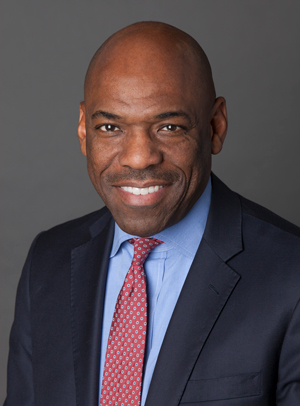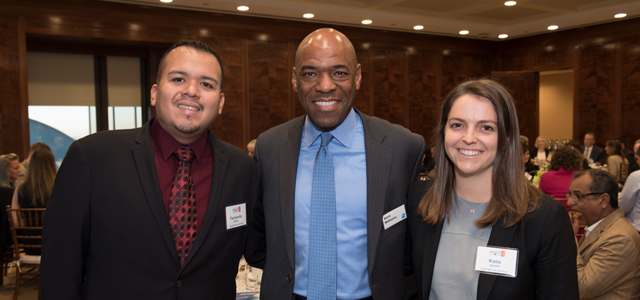Cash is no longer king with the advent of easier payment methods and increased adoption of debit and credit card payments in today’s digitally enabled marketplace. From micro-businesses to major retailers, there are solutions that make it easier than ever for consumers to pay for goods and services. And payments will only get easier as new players, technologies and capabilities are constantly being introduced in this fast-paced, dynamic industry.
American Express is at the forefront of innovation in the payments arena. Anré Williams, Group President of Global Merchant & Network Services for American Express, leads the businesses that manage and evolve important partnerships for the company with key stakeholders in the payments industry, including merchants, banks, strategic and loyalty partners. Part of his responsibilities include overseeing the Global Merchant Services business, which manages the relationships with the millions of merchants around the world that accept American Express, as well as the company’s network that processes its payments globally. In this capacity, Williams has responsibility for global teams that are changing the landscape of merchant services and influencing industry trends.
Last year, for example, American Express announced that in April 2018 its merchants would no longer be required to have customers provide a signature at the checkout when making a purchase. The long-standing tradition of signing the receipt, extending checkout times, is soon to be a tradition of the past. American Express was the only major payment network to make this policy change globally for all its merchants.
 “It will be the merchant’s decision if they require a signature to confirm purchases for their business. This will apply to all merchants globally. It will provide a more consistent and simplified checkout experience,” shares Williams. “The payments landscape has evolved and requiring signatures has been a pain point for merchants. The global adoption of new technologies, like EMV chips in credit cards, provides greater security and gives us confidence the customer was there to do a transaction.”
“It will be the merchant’s decision if they require a signature to confirm purchases for their business. This will apply to all merchants globally. It will provide a more consistent and simplified checkout experience,” shares Williams. “The payments landscape has evolved and requiring signatures has been a pain point for merchants. The global adoption of new technologies, like EMV chips in credit cards, provides greater security and gives us confidence the customer was there to do a transaction.”
Williams also puts a premium on partnerships. Square, PayPal and Stripe, once seen as industry threats, are now viewed as solutions that have helped increase coverage for American Express so their cards are accepted at more merchants. With the introduction of new merchant processing systems like Square, small merchants can offer a seamless checkout experience to their customers by easily accepting all payment networks including American Express.
“Several years ago, we viewed companies like Square and PayPal as disruptors. In time, we saw that we could be partners instead of competitors. They’ve done things to help us acquire thousands of small merchants that process payments on the American Express network. And we bring our high-spending Card Members to their merchants. It’s worked well for both of us and has helped us expand acceptance of American Express,” says Williams
While the payments industry is moving towards a cashless system in the United States, American Express is a global company with merchants and card members everywhere. Understanding the payments landscape, trends, and players in all the different countries around the world is no small undertaking. Williams is an active leader that travels significantly to keep his finger on the pulse of the needs of merchants and card members domestically and internationally.
“I lead Merchant Services teams in 28 countries around the world. These teams focus on local market needs and expectations.” Williams says “We work hard to understand the merchant’s needs, so we can provide them with the best services, like marketing and fraud prevention, to help them grow their business.”

Anré Williams with two of American Express’ 2017 Customer Service Award winners, Fernando Beltran and Katie Agresta.
Listening is a critical component to merchant satisfaction. “We conduct merchant satisfaction surveys and based upon the feedback, we make changes to strengthen our merchant relationships. For example, we have reduced pricing for small merchants in some countries, made policy changes to make it easier for merchants to manage chargebacks and card member disputes, and improved processes so we can pay merchants faster.”
Williams began his career with American Express as a summer intern and has consistently taken on roles of increasing responsibility within the company with his strong focus on performance, diligent professionalism and dedication to excellence.
“I never thought I would be here as long as I have. I have been blessed in a number of ways. In any role I have taken, I have looked at the responsibilities of that position and aimed to exceed expectations. I focus intently on performance, both mine and my team’s,” he says.
From his start as a summer intern to now being one of the highest-ranking executives at American Express, Williams path to success has been very deliberate. This diligence is evident in his calculated recommendations to aspiring professionals looking to navigate the landscape of opportunities and advance their career.
“I give the same advice all the time to people who are considering new roles. I believe a new role should meet at least two out of the following three criteria: First, is the role interesting to you? You have to put your life into your work, so stick with what you enjoy. Second, who are you working for? If you have a chance to choose your leader, find someone you respect, trust and can learn from. Third, find a role that is meaningful to the core of the organization. If you have two of these three things then the opportunity should be good for your career.”
The practice of innovation is about forward motion, creating solutions and influential ideas. When asked about the career he has built to date, Williams is not resting on his laurels of past achievement. He is anchored in the reality of today, the work ahead and getting things done with the highest levels of professionalism.
“It’s hard for me to think about my legacy because I am not anywhere near stopping. But if I look back over my career, I don’t want people to think only about what I’ve done or the teams that I have led. While those are proud accomplishments, I want them to think about how I pushed for and stood for high standards, how I led with integrity, how I respected my colleagues and created an inclusive environment. I want others to think more about how I work and lead, and have respect for me as a leader and a person.”


